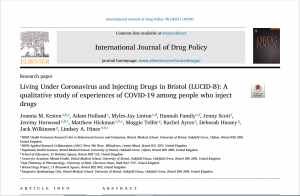Understanding the experiences of people who inject drugs during the COVID-19 pandemic
People who inject drugs are considered at high-risk of getting COVID-19, and of having a more severe infection if they do get it.
Services for people who inject drugs changed rapidly during the COVID-19 pandemic. Essential face-to-face services, such as pharmacies and some primary and secondary healthcare, continued with social distancing measures, but other support services were provided online or by phone where possible. For example, Bristol Drugs Project (BDP) increased their online and phone outreach work (BDP COVID Impact Report) to meet the needs of their clients while also protecting staff and service users.
To understand how the pandemic affected people who inject drugs and to support service delivery and inform policy for future pandemics, we conducted rapid interviews. This study, also known as Living Under Coronavirus and Injecting Drugs in Bristol (LUCID-B), is a collaboration between the National Institute for Health and Care Research Applied Research Collaboration West (NIHR ARC West), BDP, NIHR Health Protection Research Unit in Behavioural Science and Evaluation and the University of Bath. It was supported by the Elizabeth Blackwell Institute at the University of Bristol, with funding from the University’s alumni and friends. Read more about the challenges the researchers faced conducting this research during a pandemic.
What we did
We interviewed 28 people from Bristol who inject drugs, by telephone over a three-month period in the summer of 2020. Working with BDP to identify potential participants who would agree to telephone interviews was essential because government restrictions prevented the research team from doing face-to-face research.
The interviews explored participants’ experiences of:
- Challenges relating to the COVID-19 public health measures
- Changes to drug treatment medication (or opiate substitutes) and harm reduction services
- How the pandemic affected their drug use
What we found and what this means
Service access
People who inject drugs appreciated the efforts made by services to continue providing support during the pandemic. While not all the changes were seen as ideal, others were considered improvements to the previous service provision.
For example, reducing how often service users collected drug treatment medication from pharmacies and relaxing rules on taking opiate substitutes under supervision reduced stigma and embarrassment, and gave individuals greater freedom.
Rapid drug treatment was proactively offered by services, which helped overcome the reduced access to drugs and supported people who inject drugs in Bristol to self-isolate if necessary.
People liked the home delivery of sterile injecting equipment, made widely available by BDP during the pandemic. It was discreet, convenient and overcame difficulties with accessing equipment through community pharmacies, many of which had shorter opening hours and long queues due to social distancing.
Some pharmacies also ran out of injecting equipment and some stopped providing it. These issues led to some people reusing or sharing equipment.
People felt that phone contact with services was less beneficial and more difficult to engage with than face-to-face support.
Loss of connection, routine and income
Public health guidance advising people to ‘stay at home’ led to increased isolation, boredom and time to reflect, which had a negative impact on mental health. Public health restrictions limited communication with peers. Many people who were street homeless or vulnerably housed did not have phones or the internet to access services.
The pandemic disrupted daily routines and sources of income. It was difficult to make money for several reasons, including job losses and fewer people on the streets made begging difficult. Difficulties earning money reportedly contributed to an increase in crimes such as theft.
Drug use and injection-related harms
While some people described no change to their drug use, others talked about considerable increases or reductions in the amount they used and how often. Experiences of isolation, problems accessing drugs, reduced purity and reduced income all appeared to influence drug use.
Difficulties buying drugs during the pandemic meant some people changed to more readily available and cheaper drugs like spice.
Attitudes to COVID-19
Our interviews found that concern about COVID-19 and the extent to which people followed public health guidance varied.
People who were not concerned about COVID-19 talked about not knowing anyone who had it and about having more pressing issues to deal with, including their drug dependence. Others were concerned because they felt at risk from COVID-19 due to other medical issues, and talked about finding it difficult to socially distance from peers and drug dealers.
Awareness of public health guidance was good and participants were trying to follow the advice. It was more difficult to do this in some living conditions, such as hostels, and when buying drugs.
Overall, the pandemic presented considerable challenges for people who inject drugs in relation to accessing services, and the impact of the loss of connection and routine.
The study identified that tailored, more intensive support may be needed for people facing the biggest barriers to accessing services remotely at a time of heightened isolation and loss of routine. There may be opportunities to continue the positive aspects of some service changes.
Our research indicates a number of things:
- Adopting innovative approaches to reaching people and maintaining or even increasing coverage of services, may be especially important for reducing the harms of injecting drug use during pandemic restrictions.
- Harm reduction services are more important than ever.
- Local service providers need to work together across a range of issues, addressing people’s reduced income, housing access, difficulty managing mental health and support for drug use.
- The pandemic could be seen as a ‘window of opportunity’ to rethink policy and practice. For example, policy makers should consider the evidence for continuing less frequent and unsupervised drug treatment.
- It is important that people who inject drugs are not digitally excluded if remote delivery of services continues.
- Those facing the greatest barriers to accessing services remotely at a time of heightened isolation and loss of routine may require tailored, more intensive support.
- Research is needed to explore the effect of recent changes on the outcomes of treatment and mortality, to inform policy decisions.
Interim reports
We published four interim reports of our findings, covering issues such as social distancing, drug supply, accessing needle and syringe programmes, accommodation and collecting prescriptions:
Paper

Living Under Coronavirus and Injecting Drugs in Bristol (LUCID-B): A qualitative study of experiences of COVID-19 among people who inject drugs
Read the paperLead collaborators
- Dr Lindsey Hines, University of Bristol
- Maggie Telfer, Bristol Drugs Project
- Rachel Ayres, Bristol Drugs Project
- Deborah Hussey, Bristol Drugs Project
- Jack Wilkinson, Bristol Drugs Project
- Jenny Scott, University of Bath
- Hannah Family, University of Bristol
- Adam Holland, University of Bristol
- Myles-Jay Linton, University of Bristol
- Matthew Hickman, University of Bristol
ARC West Staff
Professor Jeremy Horwood
Professor of Social Sciences and HealthPartners on this project
University of Bath
The University of Bath is one of the UK's leading universities with an international reputation for quality research and teaching. Its mission is to deliver world class research and teaching, educating its graduates to become future leaders and innovators, and benefiting the wider population through our research, enterprise and influence.
University of Bristol
The University of Bristol is internationally renowned and one of the very best in the UK, due to its outstanding teaching and research, its superb facilities and highly talented students and staff. Its students thrive in a rich academic environment which is informed by world-leading research. It hosts the Elizabeth Blackwell Institute for Health Research.
